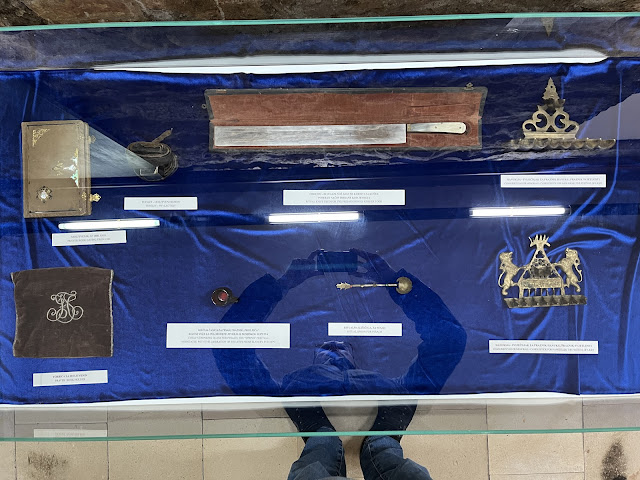Children, book club, and PhD preparation reading drove a lot of my choices this year. The reading with the kids was often re-reads of old favorites for me. Book club offered a variety that pushed me into categories I usually wouldn't read. And PhD prep offered stuff that was interesting and beneficial for my work. (However, for a variety of reasons, mostly bureacratic, it does not look like I will be doing a PhD after all... or at least not here and now.) Mostly I included books on the list that I'd recommend, but there is at least one non-recommendation.
FICTION
Making Money (Terry Pratchett) - Another Pratchett favorite discovered. (Feet of Clay, A Hatful of Sky...)
1984 (Orwell) - This did not fall under the category of 'enjoyable' reading, but it was certainly valuable. It was another book for book club (considering the category of 'propaganda' in relation to knowledge). However, I found the book to be really thought-provoking.
Watership Down (Adams) - My favorite comment on this book was in commentary at the beginning of the book which said, "[Adams] pulls off the trick of never letting us forget that they are rabbits... while also creating characters with a very human psychology." That rings true. It's a rabbit book, but it's also very relatable. (related post)
The Hunger Games trilogy (Suzanne Collins) - Quite enjoyable, quite thought provoking, and not as needlessly grotesque or disturbing as it sounds in a brief description.
The Name of the Rose (Umberto Eco) - my extended post on it
Innocents Abroad (Mark Twain) - I read bits of this as a schoolchild. Twain has a certain brilliance and humor to his writing so many years later, and yet there's also aspects of what he says that are patronizing (apparently to everyone), so maybe it's just seeing everything sarcastically. And he can get a bit tedious, but the writing has a quality in it that is attractive, and now I've been to some of the places he describes.
Old-favorites that I read aloud: A Wrinkle in Time series; Homer Price
and LOTR, still working on finishing some appendices that apparently I've never read... hadn't read Aragorn and Arwen's love story before.
NONFICTION
Metaphors We Live By (Lakoff & Johnson, upd. ed.) - This edition with its recent epilogue is really helpful for thinking through metaphorical thought and its centrality in our language and lives. I'd highly recommend it! (blog post)
How Languages are Learned (Lightbown & Spada, 4th ed) - This was a really valuable addition to my reading list. I'd interacted with some of the book before, and it'd actually helped me think through how to help my kids by fully bilingual as much as possible. However, reading through it carefully was valuable for getting a clear overview of the process of language learning and the state of research into it. Definitely recommend.
Love Thy Neighbor: A Story of War (Peter Maas) - post here with my thoughts about a visit to Sarajevo, Bosnia-Herzegovina
Filling up the Afflictions of Christ (Piper) - a consideration of three Christians' stories of suffering
The Everlasting Man (Chesterton) - Christmas meditations and much more, well worth reading and thinking about.
The Gospel Primer (Vincent) - a devotional worth reading periodically. With a very few exceptions, what is present is really valuably stirring. The exceptions would mostly be spaces for additional, though the view given of the gospel's relationship to 'the poor' is entirely negative quite unlike that given in the New Testament.
Paths to Power (Tozer) - more a booklet than a book, I inherited this book from someone leaving the country. So many decades after his death, Tozer's words still ring clearly and relevantly. The details and some of the perspectives may reflect another era, but the belivers he addressed seemingly wrestled with many of the same issues that believers face today.
Delighting in the Trinity (Reeves) - The most disappointing book I read this year... or at least the most disappointing book I meant to and tried to and began to and continued to read and then quit reading about halfway through this year. Well recommended book by multiple friends... and it was extremely disappointing. The part that was directly about Christian theology was mostly fine although it still had some strange weaknesses. The part that (attempted to) speak to opposing worldviews seemed incredibly weak and misrepresentative. This was true whether engaging non-Trinitarian views of God in general or (supposedly) Muslim ones in specific. I find myself wondering who were the multiple people who recommended the book. One good side of all this is that it made me think and develop my own thoughts to supplement the weaknesses I see in Reeves' argumentation and representation.
Polycarp: The Crown of Fire (William Chad Newsom) - This was a fascinating historical fiction imagining of the life of Polycarp that included other Apostolic Fathers and figures of the early churches (Papias, Ignatius of Antioch, Marcion, Iraneus, Hippolytus). Kids can enjoy it, though young ones may need a bit of guidance among the names, but it'd also be informative for most adults.
William Tyndale (David Daniell) - An excellent biography with a ton of historical information about the era in which Tyndale lived as well as the later effect that his (partial) Bible translation had, especially on the KJV. That was what led me to it in the first place as I was researching for a seminar I was asked to do on the sociocultural impact of the KJV, but needed to explore its history. The King James Version's New Testament was approximately 83% Tyndale's translation!
Recommendations from years past: 2024, 2023, 2022, 2021, 2020, 2019, 2018, 2017, 2016, 2015, 2014, 2013, 2012, 2011













